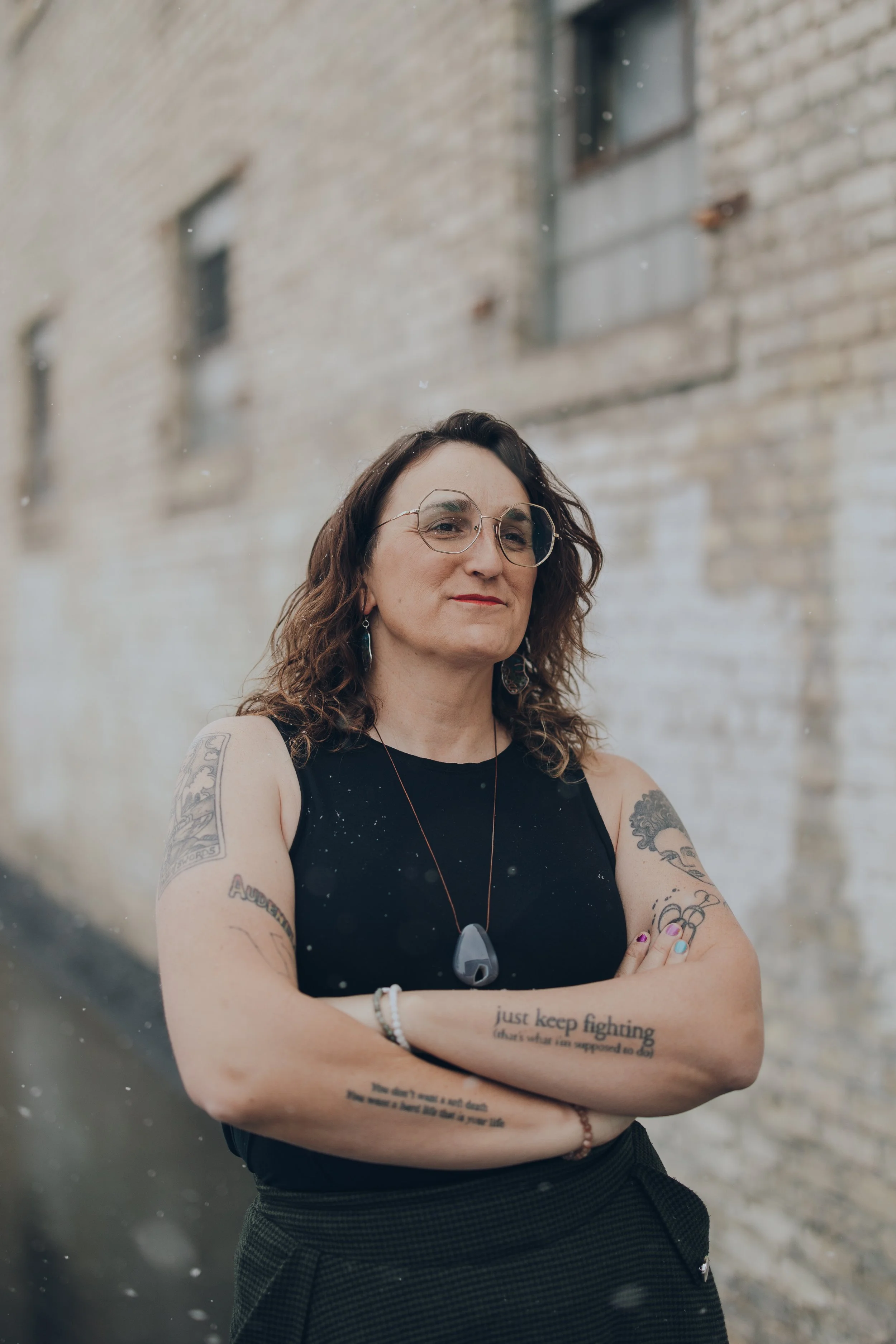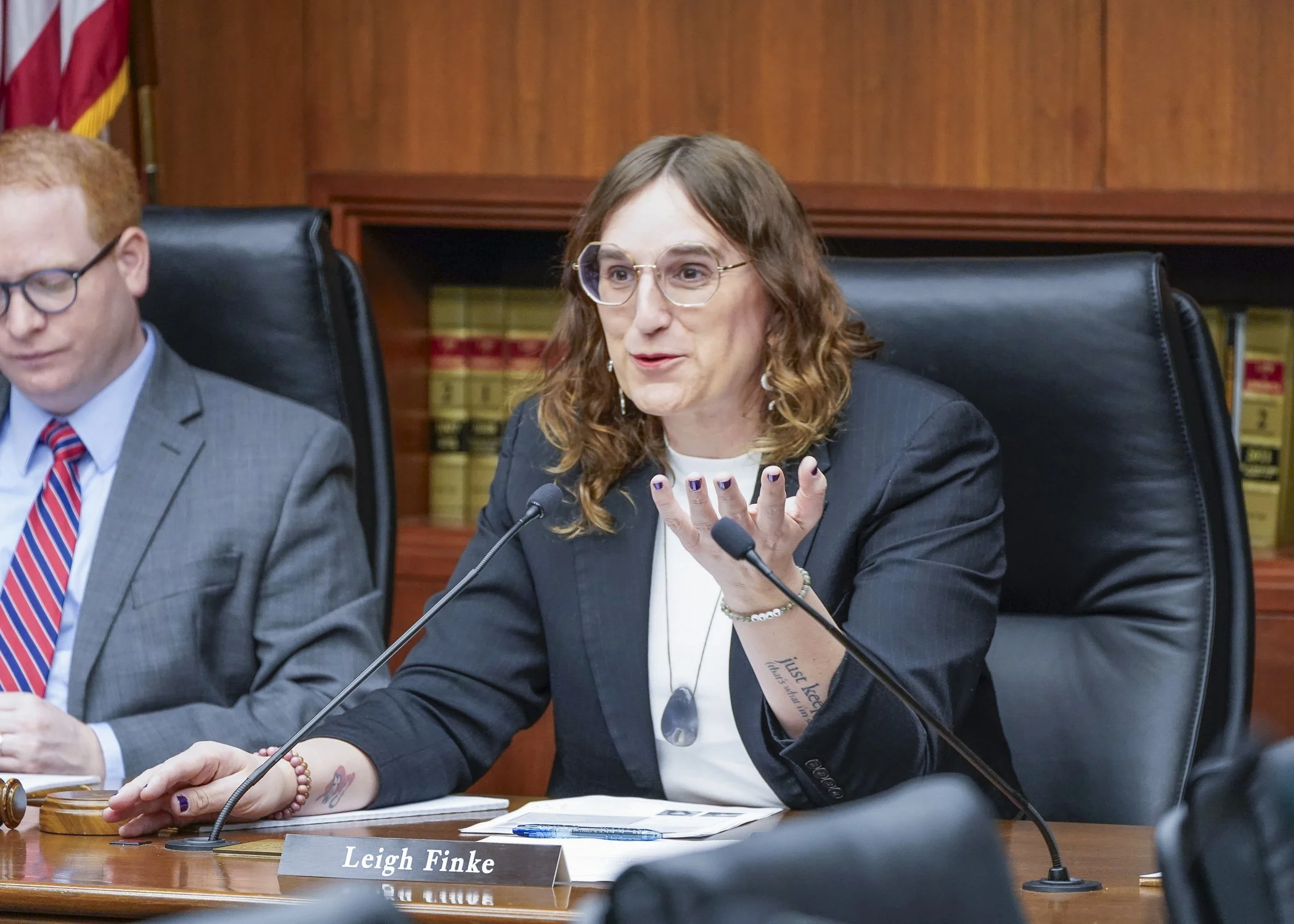She was the first out trans person elected to Minnesota’s state legislature
Leigh Finke represents Saint Paul in the Minnesota House of Representatives. She was the first out trans person elected to the state legislature, and serves as chair of the Minnesota Queer Legislators’ Caucus. Leigh serves as the Executive Director of the Queer Equity Institute, a nonprofit dedicated to increasing queer civic engagement.
As the first openly transgender member of the Minnesota Legislature, what does this milestone mean to you personally, and what advice would you give to others who aspire to follow a similar path?
Getting into politics as a candidate was a nervy decision, for sure. It wasn’t obvious that I could win, and I had no idea how I would be received by voters or colleagues. But in the end, I ran because my community needed a voice in the room to speak forqueer and trans communities. I had no idea before I got into that race how much of a representational vacuum existed. Residents in my district embraced my candidacy, and the queer community across the state showed up to support me, and all 11 of the LGBTQ+ candidates who won office in 2022.
What I am most proud of, personally, is being able to represent trans people in my work. I had a very hard journey to my own transition. I didn’t have a public model of trans life when I was growing up. It’s hard to be what you cannot see. During my first run for office, I heard all the time from trans people, and the parents of transgender children, what it has meant to see me serve in office. They can see a happy, loved, successful trans adult in a position of power.
I’m grateful to be in this position; I know that young trans people are watching, and I take this responsibility very seriously.
You advocate for abortion access and reproductive healthcare. How do you see reproductive justice connecting to trans rights?
I see no distinction between the fights for trans liberation and reproductive justice. I would add infant mortality, health inequities based on race, class, and LGBTQIA+ identity. There are many targets, but only one coordinated national movement against bodily autonomy. They want to restrict the rights of women and queer people, whether it’s abortion, contraception, and transition healthcare, the attack is fundamentally the same one used against all of us, across America: women and queer people should not have bodily autonomy.
Abortion is a trans issue, trans rights is a women’s issue. We are all in the same fight to protect our basic human rights. And if we’re going to win this fight, we’ll have to do it together.
You created various books and documentaries with 1517 Media. How did that work inform your efforts as a legislator?
The most important part of my work has always been storytelling. This was true when I worked as a journalist, author, documentary filmmaker, and as an organizer, activist and now as legislator. All of the work I do to improve the lives of women and queer people is rooted deeply in learning and sharing the stories of others.
Working as a journalist, or on projects like White Savior and Ending the Silence, I discovered how much responsibility lives in holding others’ stories, and telling them with accountability. I see this very much in my work at the capitol. I hear stories of pain, loss, trauma, discrimination, violence. I’m hearing these stories because I have an opportunity to take those stories and do good with them.
What initially sparked your interest in pursuing politics? And, what would you recommend to other trans folks wanting to get involved in legislative work?
I got started in activist movement politics in college, protesting the Iraq War. But I didn’t start thinking about actually running until about 2021. At that point, the conservative national anti-trans movement reached all of the states, including Minnesota, where bills were debated that were pointlessly punishing and cruel. By then it just seemed obvious we needed someone in the Capitol to speak for our community. I’m honored to have the chance to serve with my queer colleagues, and represent our community.
As for recommending running to other trans folks, it’s difficult to say. It’s just so situational. In the Minnesota House, I serve with two other non-binary folks, Liish Kozlowski and Brion Curran. We have had great success legislatively, but I have been viciously targeted and attacked, and that has taken a real toll on me. I know that Reps Curran and Kozlowski have experienced their own version of anti-trans attacks. Even here, where we have achieved great things, it’s been extreme. But it’s also been tremendously rewarding, and humbling. I have never been prouder of the work I’m doing. I don’t know how long I will stay in this job, but there’s work to do and I’m going to try to do it. Which is to say: if you’re going to run, then I say: know yourself, know your limits, and run. And when you’re done, be done.
Tell us more about the Trans Refuge Bill -- what is it? What steps did you take to pass the bill? And, how did it feel to get it passed?
When I was elected in 2022, states across the country were banning or restricting healthcare access, they were attacking doctors, parents and patients with terrible new laws. It seemed like Minnesota, with our new trifecta, had to take whatever assistive action we could. The answer to how we could help our community around the country was the trans refuge bill. If other states weren’t going to offer lifesaving healthcare to trans and nonbinary people, we would welcome those patients here.
The Trans Refuge bill—now law—protects access to transition related healthcare for anyone in the state of Minnesota, and simultaneously protects doctors and nurses and providers of gender affirming care. It was an incredibly difficult, rewarding process to pass, and it would not have happened without the effort of every member of the Queer Caucus and the DFL leadership in the MN House, who gave us the space to really make the case that this bill had to be elevated to a party-wide priority. Luckily, we had the support of Governor Tim Walz, who was not afraid to speak out on behalf of trans rights. In the end, the House passed it at 545 in the morning after a long and ugly filibuster from the GOP.
The debate was difficult, and nasty, but also inspiring, illuminating, and incredibly meaningful. I consider the passage of the Trans Refuge Bill the most important achievement I’ve ever been a part of. I am honored to have had the chance.
What other change do you hope to make possible if/when you're re-elected?
I have three top priorities when I get back to the capitol this winter.
The first is passing our modern inclusive Equal Rights Amendment. This would put protections for reproductive justice and trans rights in our constitution. It’s my number one priority. We passed it through the House last year, but it failed to get through the Senate.
The second is a series of changes to our school policies to make all schools more inclusive. I’m talking trans inclusive, but also ADA compliant. And racially and ethnically inclusive too. Our schools are not serving all our students equally, and we can fix that with gender inclusion policies, updated facility planning, and more.
My third priority is a total ban on the use of solitary confinement in our state prisons. This is long overdue, and it’s time to end this practice once and for all.
What does it mean to you to be a feminist?
To me, feminism means committing ourselves to the fight for the equity for and equality of all women and queer people. Feminism is intersectional and intergenerational, queer- and trans-inclusive. Feminism recognizes that gender liberation provides freedom for everyone, because patriarchal systems of oppression are creating harm for everyone.
Finally, which feminist leaders most inspire you?
Sinead O’Connor, Audre Lorde, and Andrea Gibson. These are the people who I read or listen to the most when I need inspiration for the fight day-to-day.
Recently, though, I am finding myself deeply inspired by the queer and trans folks who lived in the years before a public queer rights movement launched in the 1960s. Ruth Ellis, Annie Tinker, Frances Thompson…women whose lives typified intersectional queer feminism long before such concepts were in the lexicon. They remind me of all that has already been done, and why we must continue to do more.





